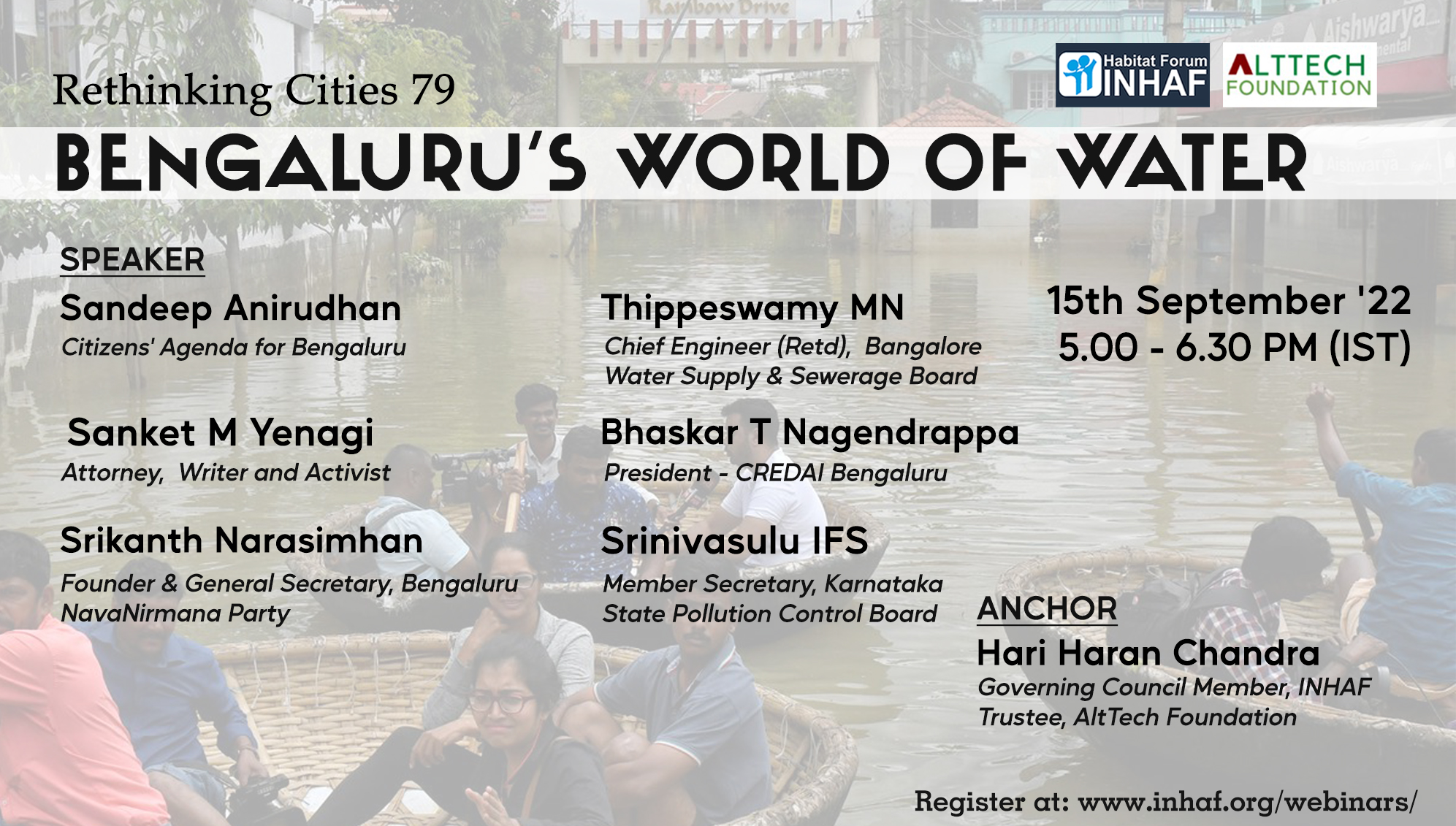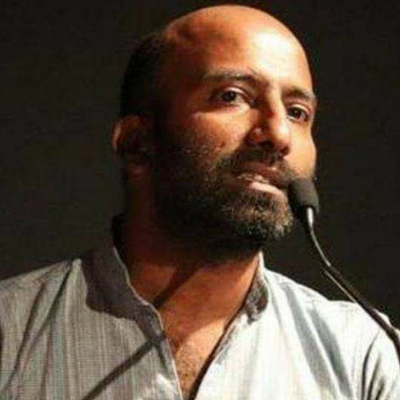
Speakers
-
 Bhaskar T Nagendrappa
Bhaskar T Nagendrappa -
 Hari Haran Chandra
Hari Haran ChandraHari Haran Chandra is an environmental economist, a journalist and a 1990s pioneer of green buildings in the world. He has founded and built businesses that mainstreamed technologies and solutions for ‘zero energy development’ pioneering green directions way ahead of its time. He has mentored a new generation of green entrepreneurs on money, markets and on solutioning sustainability that makes good business sense. His work on solutions for water and energy management in the urban and rural context and his incisive reports on the economics and ecology of urbanising have influenced change in many segments. He drives today a Consortium-led approach, at AltTech Consortium, to mentor retrofit solutions for buildings to help secure freedom from the grid. He is a Senior Fellow and member of the Indian Green Building Council and founder trustee of a couple of other organisations in the space.
-
 Sandeep Anirudhan
Sandeep AnirudhanSandeep Anirudhan is a full time volunteer, building communities to promote ‘conscious living’ as a tool to catalyze awareness and drive action, in areas such as Sustainability, City Governance, Climate Change, Citizen Engagement, Grass-root democracy, Education/Learning, Water Security, Sustainable Mobility, Lake Activism, Urban Community Farming, Natural Farming, Conservation, Green Activism, Restoration of our planetary ecosystems, etc., Please find his communities listed here: bit.ly/ConsciousCommunities
What inspired him? Sandeep Anirudhan was a Serial Entrepreneur and Management professional, whose witnessing of death up close opened up the self awareness that ‘death’ is ‘real’, that our ‘time’ in this ‘life’ is limited, and one must use the time we have on meaningful things; this realisation made him revisit all his life choices, prompted him to audit what he was doing with the time he has on hand. Realising that it is being wasted in a conventional lifestyle, he turned his back on it, and decided to use his time on ‘earth – our only home’, for its betterment.
Ever since, he has been living a life of questioning everything, and contribution to the planet and society. His personal and public lives are an example of ‘minimalism’, non-transactionalism and community engagement. He has not earned a penny since 2013, does not have any savings, survives on the hospitality of his family, spends all his time on advocacy and activism on myriad causes, supported by occasional public crowd-funding. He has put his trust in the universe. And that trust has paid off, enabling him to create so many different platforms for change. From experience, he says: ‘when one contributes selflessly to society, society has your back!
-
 Sanket M Yenagi
Sanket M YenagiMr.Sanket, as a Founder and CEO, has been actively leading the law firm viz.,THE LAWMEN INTERNATIONAL since 2006, contributing to its success and achievements in the areas of law across Asia, more particularly for underprivileged and downtrodden class of the society.
Adding to all, Mr.Sanket is a Philanthropist, contributed significantly for education, clothing, shelter and employment of the poor and underprivileged.
Mr. Sanket has addressed various seminars, conferences, symposiums, talks on the subjects of legal, sociological, political, economic importance. Various Television Channels, Newspapers, Weeklies, often broadcast and publish his interviews and expertise on various complex legal issues.
Legal acumen and expertise of Mr.Sanket in the matters pertaining to interpretation of Article 370 of the Constitution of India in relation to Jammu and Kashmir, power of the Speaker of the Assembly to disqualify Members of the Legislative Assembly on the ground of defection; on the powers of the Election Commission in relation to free and fair elections and election offences; on the powers of Enforcement Directorate under the PMLA to arrest and seize in relation to money laundering allegations; on the limitations of powers of the CBI to arrest and seize in relation to economic offences; on the Hyderabad rape accused encounter case,on Nirbhaya rape case, and on several important issues have been widely published in the media and in law journals.
-
 Srikanth NarasimhanFounder and General Secretary, BNP
Srikanth NarasimhanFounder and General Secretary, BNPSrikanth Narasimhan is Co-Founder & General Secretary of Bengaluru NavaNirmana Party (BNP), a new-age unique political party focused on Bengaluru and its Municipal Governance. Through BNP, Srikanth aims to build a citizen-participative & transparent model of governance at the city level. The Founder & General Secretary of Bangalore Apartments’ Federation (BAF), he built the largest citizen group in the country, which today comprises 850 apartment complexes in Bengaluru as members representing almost about 6 lakh citizens. Srikanth is extremely passionate about social & civic issues; he has brought in a lot of interventions in the areas of waste water management, water conservation, solid waste management, energy conservation etc., specifically relating to apartment communities.
Srikanth is also an entrepreneur- the co-founder of Veda Corporate Advisors, a leading investment banking firm in India. Before co-founding Veda, Srikanth worked with Ernst & Young, ICICI Venture, TATA Motors and TATA Technologies. Srikanth has an MBA from IIM Bangalore and holds an Engineering degree from BITS Pilani.
-
 Srinivasulu IFS
Srinivasulu IFSIFS officer from 1997 batch, Srinivasulu is currently serving as the Member Secretary of the Karnataka State Pollution Control Board.
His Indian Forest Service began at Nagarahole National Park and he went on to work in Bengaluru Rural and Mysore, Kalaburgi, Koppala, and Chitradurga districts.
He brought in new measures which benefitted the lives of the tigers during his tenure as the Director of Tiger Project at Dandeli’s Kali Tiger Reserve. His documentary on the River Kali garnered the attention of wildlife lovers world over. Few segments of the documentary was released by Hon’ble Prime Minister Narendra Modi at the COP 21 Summit meeting held in Paris.
Successively implemented various programmes for the progress of the thousands of dalit families as the Managing Director of Dr. B.R.Ambedkar Development Board. His contribution to the conservation of Western Ghats as the Chief Conservator of Forests, Shivamogga is unique.
-
 Thippeswamy MN
Thippeswamy MNWorked in Bangalore water supply and sewerage board for thirty five years and retired as chief engineer (super time)
After retirement worked as Adviser/consultant for many public and private institutions for both national and inter- national organisations.name a few IISc, IIHS, BWSSB, KSPCB, ARGHYAM, IDeck, EMPRI (GOK), ENZEN, HYFLUX (SING), CH2MHILL (USA), TTI (AUS), Etc
Member of many professional organisations of national and international water and wastewater associations’ .from last 30 year such as IWA(UK),WEF(USA),AWA(AUSTRALIA), IWWA( INDIA) IPHE(INDIA)and Vice president of IPHEBANGALORE centre Etc Member of Doctrol committees in ISEC , UTS (Aus)
Travelled widely around the world to various countries such as USA, HONG KONG ,AUSTRALIA, JAPAN, ENGLAND, FRANCE, GERMANY, SWITERZELAND ,SINGAPORE,PHILLIPINES, RUSSIA,SPAIN, AND many more .for training, conferences, study tours ,finalising project funding ,from JICA.AUSAID,FRENCH FUNDING, USAID , NRCP , etc
During these fifty two years of professional experience introduced highly innovative projects such as GIS, Municipal wastewater reuse, reduction of un accounted water, preparation of master plan for BWSSB, organising international funding from Japan, France, Australia, USA, Etc worked to introduce PPP in BWSSB. Worked to introduce water safety plan in BWSSB with the help of EMPRI with a pilot project as Chief Adviser. Introduced ICT in all sections of BWSSB .Taken up energy auditing in BWSSB and won national award for 11 crore saving in energy. First international fund from OECF (Japan) was brought to BWSSB for implementing CWSS IV phase 1 estimated Rs 1542 crores in 1996. Subsequently worked for CWSS IV phase II for Rs 3600 crores FROM JICA (Japan)
Delivered more than 850 lectures in water and wastewater . ALSO faculty in many training institutes such as ESCI, L&T, SUID,ISCE ,IIHS, ASCI , ICAP , IdecK Etc
A few institutions have recognise my services and honoured me such as
a)samaja sevakara samithi(regd) in 2011 b)Bangalore international airport authority in 2012 c) Bangalore Jalamandali abiyantara sangha –in2007 d) everything about water institution in 2016 etc d) everything about water of New Delhi included in the Hall of fame gave an award.
Local Time
- Timezone: America/New_York
- Date: Sep 15 2022
Bengaluru’s World of Water Woes
In a two-part discussion that brings together the decision makers and leaders of Bangalore, INHAF’s Rethinking Cities Series [Editions #79 and 80] bring you insights into the city’s state of current challenges on water [Sept 15], and what India’s third largest agglomeration can do to Water Governance Beyond Governments [Sept 20].
Bangalore hit national and global headlines with the deluge that had a large swathe of the east and southeast of the city mired in water. Thousands of families were evacuated. The poor suffered the most while whatsapp and media relished in showing pictures of families of the super-rich deserting their homes for a few days.
Where lies the challenge? Why was the city so poorly prepared? What are measures the BBMP—with a $ 3-billion annual revenue – has implemented over the years? Why were the rainwaters not draining out of the roads and the residential and commercial areas?
Is it that the city has received rains beyond the norm? This August the city saw 184 mm of rainfall this August 2022. It is reported to be the highest in four years. The city’s average August rainfall over the last 20 years is at 125 mm. Last year in the same month the city received a rainfall of 98 mm, while in August 2018 it was 158.3 mm.
The city’s drainage has desperately needed attention specially in the cascade of lakes to the east and south of Bangalore. In the 1990s the City had worked on a major project to improve the drainage from Koramangala across the IT corridor to Whitefield which is now called the IT Corridor. To the north, too, from further north of Yelahanka to the Manyata Tech Park and further down to Jakkur, a disaster is waiting to occur—if the waterways are not unclogged. There are CSOs working as activists but claim they are blockaded by either govt agencies or by companies who are the encroachers.
What should the city do to this natural cascade of lakes to ensure that the waterways or the network of natural canals are free and the larger drainage of the city gains greater resilience for the future? The choking of some of the lakes in such cascades, or the encroachment of many of the waterways, the kaluves and raja kaluves, have been part of the challenge. Town planners have looked the other way, builders have had a field day, is one part of the story. Builders have their defences, too.
The larger challenge, beyond the flood threats that the city faces, is the grim water supply situation. In 2108 a senior minister in the Congress cabinet in Karnataka said, “Bengaluru will not face any water crisis. Even in the summer, there will be no problem of drinking water.” He was reacting to a BBC News report entitled ‘The 11 cities most likely to run out of drinking water’. Bengaluru featured second on the list of the world’s water-deficit cities.
So what is the reality? The city needs 200 crore litres. Less than half is provided by BWSSB, the water utility. The rest is drawn from borewells in a city that has arguably the fastest depleting groundwater table in the country at over 1500-2000 feet in many parts. All this in a city that enjoys an enviably even distribution of rainfall for ten months with over 15 mm rainfall at the minimum in each month.
This panel brings together senior representatives of the Congress Party and BNP, the Member Secretary of the State PCB, the President of Credai Bangalore which is the city’s premier association of builders, and an activist environmentalist who has stirred the BBMP into discomfort with indefensible proof on abuse of laws and regulations around lakes. The discussion is curated and anchored by one of the country’s green leaders who has striven to strike the balance between economics and ecology, between the government and user resistance to change.
